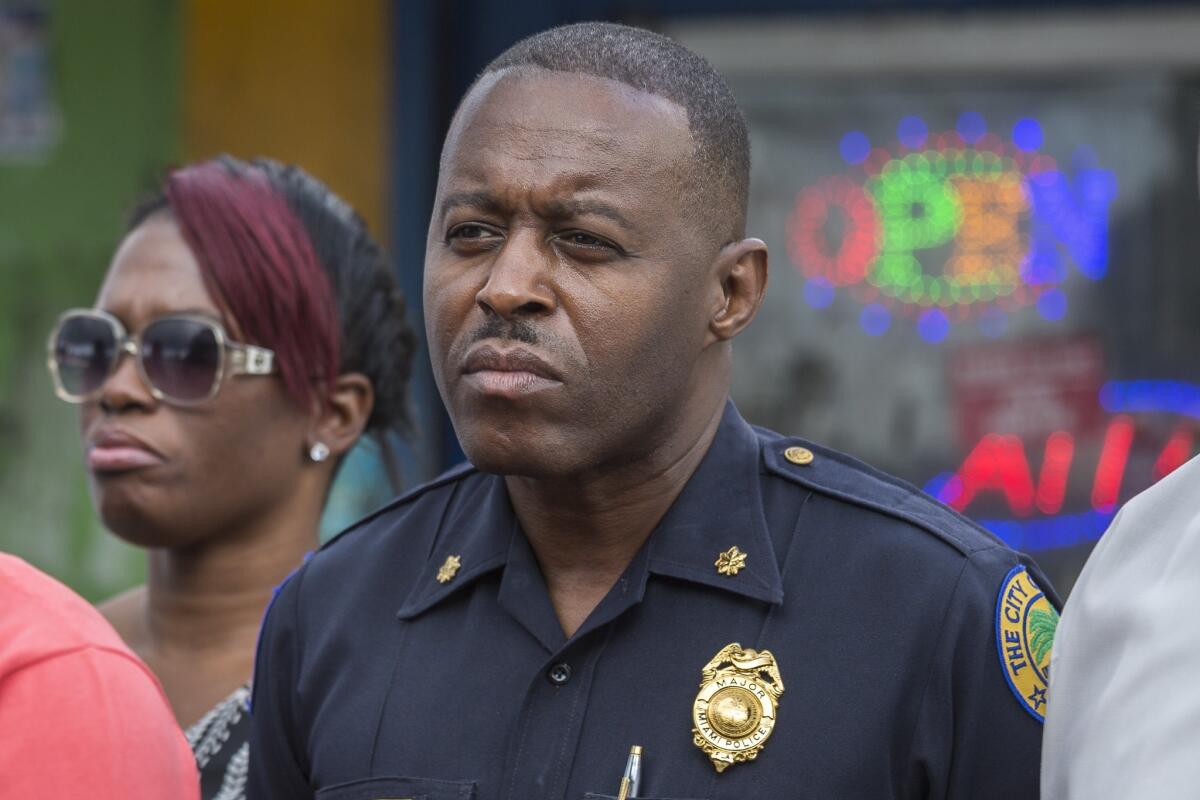New Ferguson police chief recalls being singled out by cops as an African American youth

Miami Police Maj. Delrish Moss is shown in January. Moss was named police chief in Ferguson, Mo.
Reporting from Ferguson, Mo. — Delrish Moss experienced the worst of policing growing up in inner-city Miami. Those close to him say that makes him the ideal person to bring the best of it to Ferguson, where African American mistrust of police dates back long before the fatal shooting of Michael Brown.
Moss, a 51-year-old black man, was picked this week to lead the police force in the St. Louis suburb thrown into turmoil after white officer Darren Wilson shot Brown, an unarmed black 18-year-old, on Aug. 9, 2014.
Although Moss watched from afar the protests and riots that followed Brown’s death, he said the pain felt familiar. He was still a child growing up in Miami’s tough inner-city Overtown neighborhood when a friend was killed by police. Moss soon had his own unwarranted encounters with officers.
See more of our top stories on Facebook >>
When Moss was around age 14, an officer suddenly pushed him against a wall, frisked him and searched through his belongings before leaving, offering no explanation. About a year later, another officer pulled up and used a racial slur. He was a teenager when rioting broke out in 1980 after white police officers fatally beat a black motorcyclist.
Rather than turn against police, Moss decided to try to make improvements from within. He was hired as a Miami officer in 1984, motivated, he said, to “give my community the police service I thought we deserved and treat people much better than I had been treated.”
“That’s what fuels my love for law enforcement,” Moss told the Associated Press.
He faces a daunting task in Ferguson.
A St. Louis County grand jury and the U.S. Department of Justice declined to indict Wilson, who resigned in November 2014. But the Justice Department issued a critical report of Ferguson in March 2015, citing racial bias in Ferguson’s criminal justice system. The Ferguson City Council last month agreed to a settlement with the Justice Department calling for police and court reforms.
NEWSLETTER: Get the day’s top headlines from Times Editor Davan Maharaj >>
Many black residents told Justice Department investigators stories of being pulled over for no reason, or being victims of police threats or brutality. About two-thirds of the around 20,000 Ferguson residents are black, but the police force has historically been mostly white. Currently, eight of 46 officers are black.
Moss rose through the ranks in Miami working in different departments, including homicide. He was named public information officer 20 years ago. Former Police Chief Manuel Orosa promoted Moss to the position of major in 2011.
Orosa said Moss was instrumental in establishing an improved relationship between Miami’s African American communities and the police department after a series of police shootings of unarmed black men and teenagers under the previous chief. Moss established monthly breakfast meetings with influential black pastors that went from tense encounters initially to friendly and productive get-togethers, Orosa said.
“He was able to bring our police department closer to certain segments of the community that had been alienated,” Orosa said.
Ferguson, as part of the agreement with the Justice Department, is embracing a community-oriented policing model that calls for officers to be involved in neighborhood groups and the community, rather than simply reacting to crime. Ferguson Mayor James Knowles III said Moss will be vital in implementing that model.
“What really stands out in Mr. Moss’ background is his ability to deal with the public,” Knowles said. “We need somebody at the top with the experience and skill to lead our department in doing that.”
ALSO
Chicago teachers hit picket lines, shift to rallies at colleges
Protests but no prosecution: 5 lesser-known shootings by police
They’re 400,000 strong and the Pentagon sees them as an emerging threat
More to Read
Sign up for Essential California
The most important California stories and recommendations in your inbox every morning.
You may occasionally receive promotional content from the Los Angeles Times.










